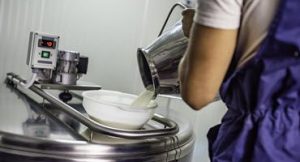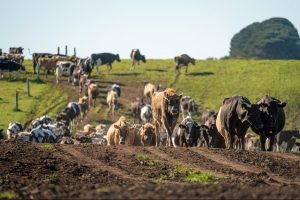
“When you have a value-add component, you invest in it,” Astridge says.
“And what we need is some upfront investment. That’s not necessarily in dollars, but in time and effort and energy as well, to create a sustainable workforce for ourselves.”
Astridge spoke at Dairy Women’s Network How to Build a Bloody Good Business webinar recently, which covered several topics, including The Current Labour Crisis – How we can increase the resilience of the people component of your business when considering the current talent crisis?
Astridge, alongside guest speakers and dairy farmers Jason Strawbridge and Doug Avery, took attendees through some important ways they could mitigate risk, make themselves attractive employers and invest in the people component of their business to create a sustainable business.
Current challenges in the dairy farming labour market included dairy farms being heavily reliant on people to operate, and not attracting enough people to ensure safe and optimum operations.
“The competition for labour is increasing and on-farm dairy has failed to secure a place as a professional career in the hearts and minds of many who have experienced work in the industry, or those looking from the outside in,” she says.
“We simply aren’t as attractive as other sectors.”
Many of those entering the dairy sector left within one year, and with a lengthy induction process, that was not ideal for farm employers.
An ageing workforce and urban drift meant eligible workers aged 20-30 were being absorbed into urban centres.
“It’s a perfect storm of an industry that has traditionally looked after itself and created its own workforce, now not doing so,” she says.
“Families are smaller and young people are not staying in the on-farm workforce.”
She says looking widely for new staff was best; setting up farm work to be attractive to a broader applicant pool; considering seasonal resourcing options and attracting people who are already inclined to join the sector, while doing more to grow our own workforce again within rural families by encouraging rural young people to come back to rural.
The more options, the better.
Strawbridge hosts Ashburton College students once a fortnight for work experience and has used Irish agricultural students successfully.
“It is a fantastic source of short-term labour at the busiest time,” Strawbridge says.
Avery is involved with child and youth development charity the Graeme Dingle Foundation, helping young people along their career journey.
“When you embark on personal growth on another human being, they start to love life,” Avery says.
“They start feeling valued and wanted.”
Astridge says employers need to ‘up their game’ and learn what it takes to be competitive and attract and retain those who have a choice around employment.
“We need to understand what hours people are prepared to work, how much their time is worth to them, and explore different ways of working and employing people,” she says.
Avery says his family had focused strongly on recognising staff members’ contributions.
“We love telling people what we appreciate about them,” Avery says.
“The last job we advertised had 75 applicants and 10 were suitable. We have concentrated on making ourselves a highly desirable employer and it has worked.”
Strawbridge says they move to once-a-day milking on the shoulders of the season, including the first four weeks of calving, to manage workload.
“The potential 5-6% production loss in August is more than enough repayment for the benefits it brings of reduced hours and allowing time to get staff and systems up to speed for the next season,” Strawbridge says.
“People are ready to throttle down come September, when the grass is growing.”
Astridge says staff development and training was now expected by employees.
“Employers need to invest wisely by focusing additional development and investment in those who can be ‘long term’ for the sector,” she says.
“There is a small short-term cost, but it is mitigated by the increase in tenure and less stress on your workforce.”
Strawbridge says a staff member handing in their notice seven years ago left the farm under immense pressure.
“We were three weeks away from drying off and our main tractor driver was gone, with no one skilled to replace him,” he says.
“At the time, we didn’t have the environment where we were training people to fill roles. We were caught short and it impacted us for quite a while, potentially right through into the spring.”
Today, he ensures all staff are trained fully for their roles.
“We are more prepared and we have a better environment,” he says.
“We’ve got guys down to 40-48 hours a week, it’s a more sustainable environment. We haven’t had a turnover in staff for the last four years. We are aware of what each staff members’ goals are, whether it’s training or moving on to something else, and we help them to do that.”

























